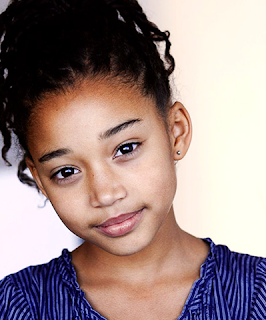The Racial Games
Spoiler Alert: This owl refers to a character in The Hunger Games and audiences' reactions to its recent movie. If you're still reading the first book in the series and don't like spoilers, you may want to skip reading this one until later.
By now, many of you have likely read The Hunger Games book series by Suzanne Collins, and may have also seen the recent movie based on the first book. I've read them but haven't had a chance to see the movie yet (I'm re-reading the first book first) but have been pretty intrigued by a development that I don't think Collins or many Hunger Games fans would have expected: the reaction by some to the actress who plays the character Rue being African American. For those of you who aren't familiar with the story, Rue is a young girl who is forced to duel in the "Games" along with the main character, Katniss. Despite being expected to kill each other, the two girls form an alliance, and Rue is arguably one of the most lovable characters in the series.
Rue is described physically in the book this way: "She has dark brown skin and eyes." Somehow, this point was missed by quite a few readers who have since been outraged to find her portrayed by the African American actress Amandla Stenberg (pictured at left and below.) Some of these reactions have gone so far as to say that it "ruined the movie" for them, and much, much worse. There's an impressive collection of these on the website Hunger Games Tweets (some strong language here as well, fair warning.)
The controversy has not been missed by The Harry Potter Alliance either - here's a video post about it on the HPA's Tumblr page.
I admit, when I first read the book, I did not picture Rue as African American either. I pictured her more as Native American, which may have more to do with her character being from District 11, a place in the story known for its agriculture. One of the glories of reading is that your own imagination can fill in the blanks like this. But you have to pay close attention to what the author is telling you as well: Rue has "dark brown skin and eyes." She clearly does not look like Luna Lovegood (as one disappointed fan quoted on the Hunger Games Tweets website had pictured.)
In our last owl, Jolinda talked about racial profiling, and before that we learned about our own hidden assumptions. This is another way racial profiling and assumptions work. Why would so many readers, despite the words written in the book describing this character's skin as dark, assume that she is Caucasian? Or be so dramatically disappointed to find her portrayed otherwise?
Many of them may have been acting on an assumption that is at the heart of racism: white equals good, black equals bad. They assumed that because she is a good, lovable character, she must be white. We need to continually confront these kinds of assumptions in ourselves and others if we are ever going to live in true equality.
Hunger Is Not A Game
As many of you know, The Harry Potter Alliance ran a campaign recently related to the release of the The Hunger Games, called Hunger Is Not a Game, helping to raise awareness and combat real-world hunger through a partnership with Oxfam America and Imagine Better.
It's ironic that the controversy surrounding the movie has to do with race, when real-world inequality is one of the biggest causes of real-world hunger.
The Harry Potter Alliance's campaign has come to a close, but you can still participate by signing the GROW pledge andlearning more about hunger here.
Have you seen it?
Have you read or seen The Hunger Games? What do you think about these issues? Let us know!



No comments:
Post a Comment